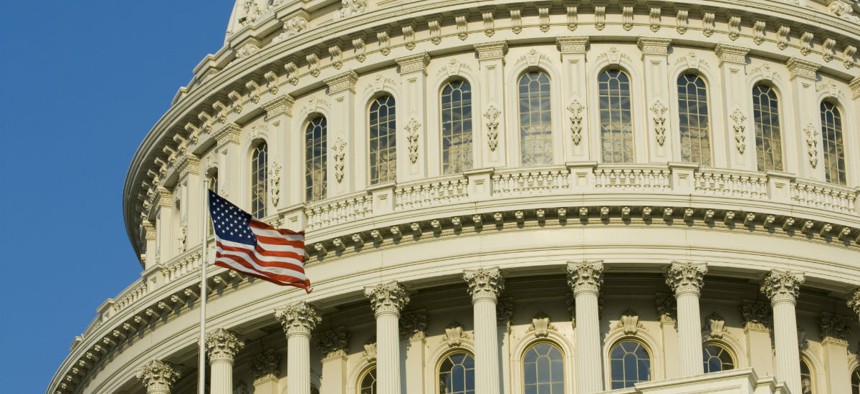
The 19 Agencies Trump Tried To Kill Aren’t Going Away
Some will even get a funding boost.
A year ago, the fledgling Trump administration wrote a “skinny budget” that proposed eliminating 19 federal agencies long regarded with suspicion by many Republicans.
But in the fiscal 2018 omnibus spending bill now on the verge of approval by the Senate (the House passed it Thursday afternoon), none of the 19 are being eliminated. Some are even due for raises.
The Trump administration, in its fiscal 2019 budget request, backed off the wholesale elimination of most of those agencies and converted some prior requests to zero out funding to simple cuts. But the agencies’ congressional patrons—and in some cases the agencies themselves—resisted. In an example of the latter, the Corporation for Public Broadcasting issued a lofty rebuttal to the administration in February after the White House proposed rescinding all but $15 million in each of its fiscal 2019 and fiscal 2020 public media funds.
“Americans place great value on having universal access to public media’s educational and informational programming and services, provided commercial free and free of charge,” said Patricia Harrison, CPB’s president and CEO, in a statement. “Since there is no viable substitute for federal funding that would ensure this valued service continues, the elimination of federal funding to CPB would at first devastate, and then ultimately destroy public media’s ability to provide early childhood content, life-saving emergency alerts, and local journalism.”
The National Endowment for the Humanities, took a different approach, and for fiscal 2019 asked for only $42 million (a cut of more than $100 million) for its “orderly closure.”
For now, each of the 19 Trump-targeted small, independent agencies, have won reprieves. Here’s what the massive 2018 omnibus spending bill has for each of them:
The African Development Foundation, an independent agency that establishes targeted development programs in underserved parts of Africa, will receive $30 million through Sept. 30, 2019.
The Appalachian Regional Commission, an economic development agency created in 1965 to work in partnership with federal, state, and local governments, will receive $155 million, a rise of $3 million over its fiscal 2017 level.
The Chemical Safety Board, an independent reviewer of chemical industry accidents and regulations, will receive $11 million, the same as it received in 2017.
The Corporation for National and Community Service, which runs AmeriCorps/VISTA and other volunteer programs for improving fellow citizens’ lives, will receive $1.06 billion, a hike of almost $34 million, the bulk of it going to AmeriCorps, its largest program.
The Corporation for Public Broadcasting, which partially funds the Public Broadcasting Service and NPR, will be fully funded at $445 million for both fiscal 2018 and 2019.
The Delta Regional Authority, a partnership that supports job creation and development in rural Mississippi and Alabama, will receive $25 million, a $10 million hike over 2017 funding.
The Denali Commission, which was created in 1998 to provide economic support throughout Alaska and in 2015 assigned to be a lead coordinating agency for relocating villages in rural Alaska that face environmental risks, will receive $30 million, double its 2017 budget. The commission’s federal co-chair, Joel Neimeyer, told Government Executive on Thursday that, “With the pending decision by Congress to add an additional $15 million to the agency’s fiscal 2018 budget, it is clear that the legislative branch is now telling the commission to start implementing solutions to protect the built environment and carry out village relocations. The commission stands ready to transition to an implementing agency, and we are pleased that Congress holds this trust in our small independent federal agency.”
The Institute of Museum and Library Services will receive $240 million, a hike of $9 million.
The Inter-American Foundation, created in 1969 to give grants that channel development assistance in Latin America and the Caribbean, will get $22.5 million through Sept. 30, 2019.
The U.S. Trade and Development Agency, which helps companies create U.S. jobs through the export of goods and services for priority development projects in emerging economies, will receive $79.5 million through Sept. 30, 2019.
The Legal Services Corporation, created in 1974 to serve the legal needs of low-income Americans, will receive $410 million, a hike of $25 million over fiscal 2017’s level.
The National Endowment for the Arts, whose budget traditionally aligns with that of the National Endowment for the Humanities, will get $152,849,000 while the NEH would get the slightly lower $152,848,000. The amounts represent more than a $7 million increase for each endowment.
The Neighborhood Reinvestment Corporation, an independent organization created in 1977 that provides rental assistance to low-income Americans, will receive $140 million, the same as last year.
The Northern Border Regional Commission, a federal-state partnership for economic and community development in northern Maine, New Hampshire, Vermont and New York, is slated to receive a raise from $10 million in 2017 to $15 million.
The Overseas Private Investment Corporation, set up in 1971 to mobilize private capital to help solve critical development challenges, is authorized to spend up to $79.2 million for its administrative, noncredit account, a rise of more than $9 million over 2017’s level. That comes with an additional $20 million (double last year’s amount) for the cost of direct and guaranteed loans under the Foreign Assistance Act.
The United States Institute of Peace, which works with nongovernmental parties in conflict zones, will receive $37,884,000 through Sept. 30, 2019, the same as last fiscal year.
The United States Interagency Council on Homelessness, created in 1987 to coordinate between 19 agencies to reduce homelessness, will receive $3.6 million, the same amount it got in 2017.
The Woodrow Wilson International Center for Scholars, which calls itself “the nation’s key nonpartisan policy forum for tackling global issues through independent research and policy dialogue,” will receive $12 million through Sept. 30, 2019, a $2 million raise from last year’s level.







